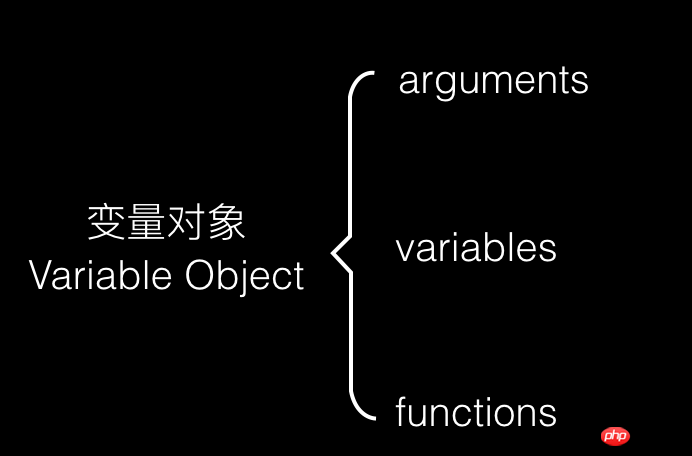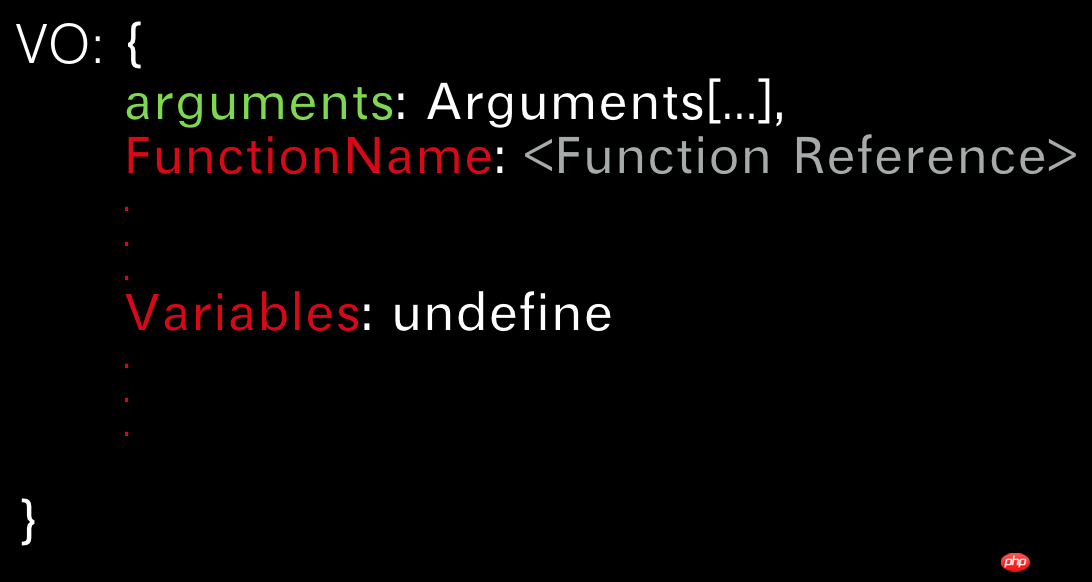 Web Front-end
Web Front-end
 JS Tutorial
JS Tutorial
 Detailed graphic explanation of Javascript variable objects and active objects
Detailed graphic explanation of Javascript variable objects and active objects
Detailed graphic explanation of Javascript variable objects and active objects
Thoughts caused by a piece of code
var laterDeclaredVar = 'I am a global variable ...';
(function(){
console.log(laterDeclaredVar); //会输出什么?
laterDeclaredFunction(); //能否被正常执行?
var laterDeclaredVar = 'I am a variable which is defined later...';
function laterDeclaredFunction () {
console.log('I can be called any where though I am declared later...');
// 上面打印的话翻译一下是:虽然我被晚一些定义了,但是我可以在函数的任何地方被访问
// I can be called any where even though I am declared later
// 后者则被翻译为:即使我被晚一些定义了,我可以在函数的任何地方被访问
// 这里需要补充一个知识点是though和even though的区别:
// though和even though都引导让步状语从句,但是though和even意为“虽然”
// though引导的句子所说的是事实
// 而even though(=even if),意为“即使”
// 有退一步设想的意味,所说的不一定是事实。
// 为了写这个打印专门复习了一下英文,查了一下这个句式该怎么写,都是知识点,快快拿小本记好!
}
})()What this code requires us to think about is what the third line will output on the console ? Can the call to laterDeclaredFunction() in the fourth line succeed?
The answer is Jiang Zi’s:

We all have a consensus that the execution order of js language is automatic From top to bottom, what if the variable laterDeclaredVar has been declared and defined on the first line, but undefined is printed on the third line? Why is laterDeclaredFunction declared on the seventh line, but the call on the fourth line succeeds? Why is this so?
It’s all about variable objects! !
First go back to the execution context life cycle part to review.

.... Review completed!
What is a variable object?
When we write a program, we will define many variables and functions, and the essence of the above problem is actually how and where for the interpreter. Find these variables and functions?
The variable object is a concept corresponding to the execution context, which defines all variables, functions under the execution context, and the parameter list of the current execution context function. That is to say, the variable object defines the parameter list, internal variables and internal functions defined within a function.

In terms of data structure, it is like this:

#The creation process of variable objects?
Take the following code as an example to see the creation process of outerFun() variable object.
function outerFun (arg1, arg2) {
var outerV1 = 1
var outerV2 = 2
function innerFun1 () {
var innerV1 = 3;
var innerV2 = 4;
console.log('i am innerFun1...')
}
function innerFun2 () {
console.log('i am innerFun2...')
}
function outerV2 () {
return 'i am outerV2'
}
}
outerFun()Its variable object creation process is like this:

The variable object is created when the function is called but before the function is executed. The process of creating the variable object is actually the data within the function. (Function parameters, internal variables, internal functions) initialization process.
What is an active object?
Before entering the execution phase, the properties in the variable object cannot be accessed! But after entering the execution phase, the variable object is transformed into an active object, and the properties inside can be accessed, and then the execution phase operations begin. So the active object is actually another form of the variable object when it is actually executed.
Global variable object
We are above We are talking about variable objects in the function context, and their contents are determined based on the data (parameters, variables, functions) in the execution context. The variable objects in the global context are different. Taking the browser as an example, the global variable object is the window object. During the initialization phase of the global context before execution, global variables and functions are mounted on the window.
#At this point, using the knowledge of variable objects to explain the execution results of the code at the beginning of the article, I have already solved the problem of Ren Duer pulse. No detailed analysis will be done here.
At this point, the variable objects and active objects in the execution context life cycle have been sorted out. Let’s talk about the next thing!

The above is the detailed content of Detailed graphic explanation of Javascript variable objects and active objects. For more information, please follow other related articles on the PHP Chinese website!

Hot AI Tools

Undresser.AI Undress
AI-powered app for creating realistic nude photos

AI Clothes Remover
Online AI tool for removing clothes from photos.

Undress AI Tool
Undress images for free

Clothoff.io
AI clothes remover

Video Face Swap
Swap faces in any video effortlessly with our completely free AI face swap tool!

Hot Article

Hot Tools

Notepad++7.3.1
Easy-to-use and free code editor

SublimeText3 Chinese version
Chinese version, very easy to use

Zend Studio 13.0.1
Powerful PHP integrated development environment

Dreamweaver CS6
Visual web development tools

SublimeText3 Mac version
God-level code editing software (SublimeText3)

Hot Topics
 1386
1386
 52
52
 How to implement an online speech recognition system using WebSocket and JavaScript
Dec 17, 2023 pm 02:54 PM
How to implement an online speech recognition system using WebSocket and JavaScript
Dec 17, 2023 pm 02:54 PM
How to use WebSocket and JavaScript to implement an online speech recognition system Introduction: With the continuous development of technology, speech recognition technology has become an important part of the field of artificial intelligence. The online speech recognition system based on WebSocket and JavaScript has the characteristics of low latency, real-time and cross-platform, and has become a widely used solution. This article will introduce how to use WebSocket and JavaScript to implement an online speech recognition system.
 WebSocket and JavaScript: key technologies for implementing real-time monitoring systems
Dec 17, 2023 pm 05:30 PM
WebSocket and JavaScript: key technologies for implementing real-time monitoring systems
Dec 17, 2023 pm 05:30 PM
WebSocket and JavaScript: Key technologies for realizing real-time monitoring systems Introduction: With the rapid development of Internet technology, real-time monitoring systems have been widely used in various fields. One of the key technologies to achieve real-time monitoring is the combination of WebSocket and JavaScript. This article will introduce the application of WebSocket and JavaScript in real-time monitoring systems, give code examples, and explain their implementation principles in detail. 1. WebSocket technology
 How to use JavaScript and WebSocket to implement a real-time online ordering system
Dec 17, 2023 pm 12:09 PM
How to use JavaScript and WebSocket to implement a real-time online ordering system
Dec 17, 2023 pm 12:09 PM
Introduction to how to use JavaScript and WebSocket to implement a real-time online ordering system: With the popularity of the Internet and the advancement of technology, more and more restaurants have begun to provide online ordering services. In order to implement a real-time online ordering system, we can use JavaScript and WebSocket technology. WebSocket is a full-duplex communication protocol based on the TCP protocol, which can realize real-time two-way communication between the client and the server. In the real-time online ordering system, when the user selects dishes and places an order
 How to implement an online reservation system using WebSocket and JavaScript
Dec 17, 2023 am 09:39 AM
How to implement an online reservation system using WebSocket and JavaScript
Dec 17, 2023 am 09:39 AM
How to use WebSocket and JavaScript to implement an online reservation system. In today's digital era, more and more businesses and services need to provide online reservation functions. It is crucial to implement an efficient and real-time online reservation system. This article will introduce how to use WebSocket and JavaScript to implement an online reservation system, and provide specific code examples. 1. What is WebSocket? WebSocket is a full-duplex method on a single TCP connection.
 JavaScript and WebSocket: Building an efficient real-time weather forecasting system
Dec 17, 2023 pm 05:13 PM
JavaScript and WebSocket: Building an efficient real-time weather forecasting system
Dec 17, 2023 pm 05:13 PM
JavaScript and WebSocket: Building an efficient real-time weather forecast system Introduction: Today, the accuracy of weather forecasts is of great significance to daily life and decision-making. As technology develops, we can provide more accurate and reliable weather forecasts by obtaining weather data in real time. In this article, we will learn how to use JavaScript and WebSocket technology to build an efficient real-time weather forecast system. This article will demonstrate the implementation process through specific code examples. We
 Simple JavaScript Tutorial: How to Get HTTP Status Code
Jan 05, 2024 pm 06:08 PM
Simple JavaScript Tutorial: How to Get HTTP Status Code
Jan 05, 2024 pm 06:08 PM
JavaScript tutorial: How to get HTTP status code, specific code examples are required. Preface: In web development, data interaction with the server is often involved. When communicating with the server, we often need to obtain the returned HTTP status code to determine whether the operation is successful, and perform corresponding processing based on different status codes. This article will teach you how to use JavaScript to obtain HTTP status codes and provide some practical code examples. Using XMLHttpRequest
 How to use insertBefore in javascript
Nov 24, 2023 am 11:56 AM
How to use insertBefore in javascript
Nov 24, 2023 am 11:56 AM
Usage: In JavaScript, the insertBefore() method is used to insert a new node in the DOM tree. This method requires two parameters: the new node to be inserted and the reference node (that is, the node where the new node will be inserted).
 JavaScript and WebSocket: Building an efficient real-time image processing system
Dec 17, 2023 am 08:41 AM
JavaScript and WebSocket: Building an efficient real-time image processing system
Dec 17, 2023 am 08:41 AM
JavaScript is a programming language widely used in web development, while WebSocket is a network protocol used for real-time communication. Combining the powerful functions of the two, we can create an efficient real-time image processing system. This article will introduce how to implement this system using JavaScript and WebSocket, and provide specific code examples. First, we need to clarify the requirements and goals of the real-time image processing system. Suppose we have a camera device that can collect real-time image data



